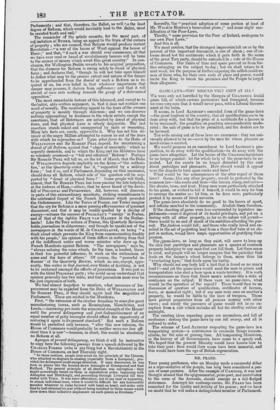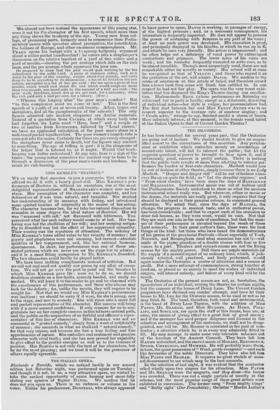MR. PRAED.
THIS young gentleman, who on Monday made a successful debut as a representative of the people, has long been considered a per- son of some promise. After the example of CANNING, it was not thought absurd that the epigrammatist, prize-poet, and contributor to the verse of the Annuals, should emerge as a full-fledged statesman. Amongst his contemporaries, Mr. PRAED has been remarked for the facility and fertility of his genius ; and we have no doubt that he will make a distinguished member of Parliament. We have noticed the appearance of this young star, were it not for ike character of his first speech, which more than any thing Shews the tendency of the age. Young men from col- lege, of 'promising parts, formerly used to commence their Parlia- mentary career with speeches about prerogative, the constitution, the balance of Europe, and other enormous commonplaces. Mr. PRAED opens his budget with a twopenny-halfpenny argument about a calico pocket handkerchief: he enters into a shopkeeper's discussion on the relative taxation of a yard of fine calico and a yard of muslin,—showing the per centage which falls on the rich man, and the per centage which oppresses the poor one. He proposed to show that the poor woald gain nothing by the tax substituted by the noble Lord. A piece of common calico, such as is worn by the poor of this country, weighs about four pounds, and costs from Gs. to Ss. aecording to its dimensions ; a tax of 4d. levied on the raw cotton, amounted to a tax of five per cent.: the tax upon a piece of tine muslin, which would cost about 40s. and which would weigh no more than two pounds, was taxed only to the amount of a half per cent. : the poor were, therefore, taxed five or six per cent. for a necessary, when the rich paid only a half per cent. for a luxury. (Hear.) "Whence this longing after" the poor man's comfort ? But "to this complexion must we come at last." This is the first speech of a youth of six or seven and twenty. Adieu, tropes and metaphors, and all the paraphernalia of the schools ! The only figures admitted into modern eloquence are Arabic numerals. Instead of a quotation from CICERO, at -which every body who had forgotten his Latin cried "Hear, hear!" and a couple or two of iambics from EURIPIDES, followed by "Loud cheers," we have an applauded calculation of the poor man's share in a well-taxed pocket handkerchief. The poor woman's humble robe is even put into the scales. Certainly the times are grievously changed : the metaphors never came to much, but the figures may amount to something. The age of trifling is past: it is the eloquence of the ledger that is listened to, as it ought. Would that book- keeping was better understood ! At any rate, here is a sign of the times : the young orator conceives the readiest way to fame to lie through a discussion of the poor man's wants and burdens. So much for rick-burning.



























 Previous page
Previous page